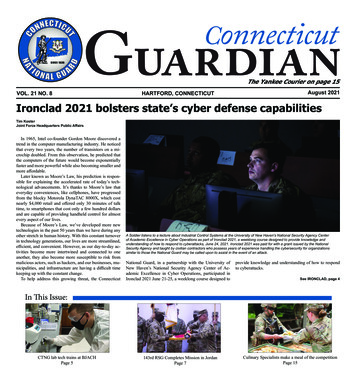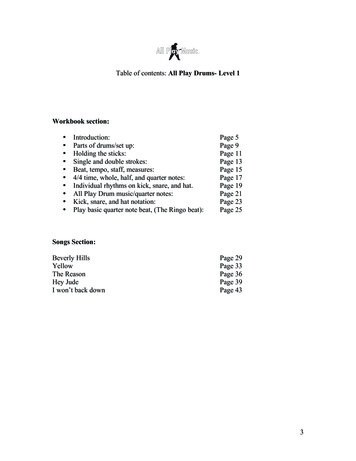
Transcription
The Yankee Courier on page 15VOL. 21 NO. 8HARTFORD, CONNECTICUTAugust 2021Ironclad 2021 bolsters state’s cyber defense capabilitiesTim KosterJoint Force Headquarters Public AffairsIn 1965, Intel co-founder Gordon Moore discovered atrend in the computer manufacturing industry. He noticedthat every two years, the number of transistors on a microchip doubled. From this observation, he predicted thatthe computers of the future would become exponentiallyfaster and more powerful while also becoming smaller andmore affordable.Later known as Moore’s Law, his prediction is responsible for explaining the accelerated rate of today’s technological advancements. It’s thanks to Moore’s law thateveryday conveniences, like cellphones, have progressedfrom the blocky Motorola DynaTAC 8000X, which costnearly 4,000 retail and offered only 30 minutes of talktime, to smartphones that cost only a few hundred dollarsand are capable of providing handheld control for almostevery aspect of our lives.Because of Moore’s Law, we’ve developed more newtechnologies in the past 50 years than we have during anyother stretch in human history. With this constant turnoverin technology generations, our lives are more streamlined,efficient, and convenient. However, as our day-to-day activities become more intertwined and connected to oneanother, they also become more susceptible to risk frommalicious actors, such as hackers, and our businesses, municipalities, and infrastructure are having a difficult timekeeping up with the constant change.To help address this growing threat, the ConnecticutA Soldier listens to a lecture about Industrial Control Systems at the University of New Haven's National Security Agency Centerof Academic Excellence in Cyber Operations as part of Ironclad 2021, a weeklong course designed to provide knowledge andunderstanding of how to respond to cyberattacks, June 24, 2021. Ironclad 2021 was paid for with a grant issued by the NationalSecurity Agency and taught by civilian contractors who possess years of experience handling the cybersecurity for organizationssimilar to those the National Guard may be called upon to assist in the event of an attack.National Guard, in a partnership with the University ofNew Haven’s National Security Agency Center of Academic Excellence in Cyber Operations, participated inIronclad 2021 June 21-25, a weeklong course designed toprovide knowledge and understanding of how to respondto cyberattacks.See IRONCLAD, page 4In This Issue:CTNG lab tech trains at BJACHPage 5143rd RSG Completes Mission in JordanPage 7Culinary Specialists make a meal of the competitionPage 15
2AUGUST 2021Downloadthe newConnecticutNationalGuard AppCONNECTICUT GUARDIANGet social with theCONNECTICUT NATIONAL GUARDofficial pages managed by the CTNG ardOfficial Unit / Leadership PagesMaj. Gen. Fran EvonFacebook - @CTNGTAGTwitter - @CTNGTAGState Command Sgt. Maj. Roger SicardFacebook - @CTCommandSgtMajCTARNG Recruiting BattalionFacebook - @CTArmyGuardInstagram - @CTArmyGuardCTANG Recruiting TeamFacebook - @CTAirGuard103rd Airlift WingFacebook - @103AWInstagram - @103airliftwing102nd Army BandFacebook - @102dArmybandFacebook (Rock Band) - @RipChord102DInstagram - 102darmybandTwitter - @102dArmyBandHHC, 169th Aviation BattalionFacebook - @HHC169AVN1-169 Regiment (RTI)Facebook - @169REG1109th TASMGFacebook - @1109thTASMGCTARNG Recruit Sustainment ProgramFacebook - ConnecticutGuardRSPCTNG Service Member and Family SupportFacebook - CTNGFamiliesAvailable on theGoogle Play and AppStoresCT Employee Support of Guard and ReserveFacebook - @CTESGRTwitter - @CT ESGR1st Co. Governor’s Foot GuardFacebook - @1GFG1771Change Your AddressTo change your home of record, please doone of the following:Retirees: ContactSgt. 1st Class Ericka Thurman atericka.g.thurman.mil@mail.mil or860-524-4813.Guardsmen and Militia Members: Contactyour chain of command or unit admin.Any further questions or concerns about theConnecticut Guardian, contact the editordirectly.Connecticut Guardian360 Broad Street, Hartford, CT 06105-3795Phone: (860) 524-4858, DSN: 636-7857E-Mail: timothy.r.koster.civ@mail.milCaptain-GeneralGov. Ned LamontThe Adjutant GeneralCommanding General, CTNGMaj. Gen. Francis J. EvonAssistant Adjutant General - AirBrig. Gen. Gerald McDonaldAssistant Adjutant General - ArmyBrig. Gen. Karen A. BerryState Command Chief Warrant OfficerChief Warrant Officer 5 Brian ErksonState Command Sergeant MajorCommand Sgt. Maj. Roger SicardState Command Chief Master SergeantChief Master Sgt. John M. GasiorekState Public Affairs OfficerConnecticut Guardian Managing EditorMaj. David PytlikConnecticut Guardian EditorTimothy KosterContributors103rd Airlift Wing Public Affairs130th Public Affairs Det., CTARNGFirst Company Governors Horse GuardSecond Company Governors Horse GuardFirst Company Governors Foot GuardSecond Company Governors Foot GuardThe Connecticut Guardian is an authorized publicationfor and in the interest of, the personnel of the ConnecticutNational Guard, State Military Department, State Militiaand their families. The editorial content of this publicationis the responsibility of the CTNG Hartford Public AffairsOffice and is not necessarily the official views of, orendorsed by, the U.S. Government, the Department ofDefense, and the Department of the Army or the Departmentof the Air Force. Connecticut Guardian is publishedmonthly in accordance with AR 360-1 and is printedthrough the Government Printing Office. Deadline forthe September issue is August 20th.
CONNECTICUT GUARDIANAUGUST 2021 3U.S. Army Sgt. 1st Class Anthony Zaharie poses for a photo after receiving an Army Achievement Medal. Zaharie enlisted in the Army in 1978 and retired in 2021, after 43 years in service. (courtesyphoto)After Four Decades, Zaharie’s Career Rife With MemoriesMaj. Mike PetersenJoint Force Headquarters Public AffairsAs a Stonington High School junior, Sgt. 1st Class (Ret.) Anthony Zaharie walked intoa recruiter’s office in need of a summer job.The No. 1 song in the country, Night Fever by the Bee Gees, was probably playingon the radio – or perhaps news that Pete Rose had collected his 3,000 Major League hit.That’s because Zaharie enlisted 43 years ago, in May of 1978.“My mom told me to get a job for the summer, and a National Guard recruiter happened to be at Stonington High School,” Zaharie said. “He said we could have you backin time to start your senior year, then finish your training after you graduate.”Zaharie raised his right hand, and spent the summer of 1978 in Basic Training at FortDix, New Jersey. As promised, he returned to finish his senior year of high school, thensoon left for Fort Eustis, Virginia, to complete his training as a 68F – Aircraft Electrician.Upon completion of his training, Zaharie was assigned to the 1109th Aviation Classification and Repair Depot, better known as the AVCRAD, in Groton, Conn. He served theentire four-plus decades of his career in that unit.In fact, he would serve in less Guard units (one) than times the unit would change it’sname (two). By the time he retired, the AVCRAD was reclassified as a Theater AviationSustainment Maintenance Group, or TASMG.But in between those 43 years, Zaharie saw generations of Guardsmen come and go.Countless command teams, multiple international conflicts (including two of his owndeployments –Desert Storm and Operation Enduring Freedom) .“I have known Sgt. 1st Class Zaharie for almost 30 years, working side-by-side formany of those. The one characteristic that has always been evident is his unwavering support and dedication for his Soldiers,” said Command Sgt. Maj. Paul Garofolo, CommandSergeant Major of the 1109th TASMG. “He has always been a people person and I thinkevery life he touched during his career, Soldiers remember that.”Anthony Zaharie – by the numbers: Years of Service: 43 Years as a Full-Time Technician: 29.5 # of TAGs: 7 # of CT Governors: 7 # of Presidents: 8He also served as a full-time Federal Technician for nearly 30 years of his tenure, retiring as a Powered Support Systems Mechanic in the TASMG’s Ground Support Equipment shop.In the early days of his career, Zaharie saw the first Blackhawks come to the Guard,previously working on the Huey fleet in his electrician capacity. As technology rapidlychanged over the decades, Zaharie realized he, too, had to change – or be left behind.“You always have to be ready for change. It’s part of military life,” Zaharie said. “Ifthere’s one thing I tried to impress upon younger soldiers, it was the need to be flexibleand adaptable.”Zaharie attributes his adaptability to his background as an electrician. “I’m an electrician first, and trained to read schematics. If you can read a schematic, you can troubleshoot anything,” he said with a laugh.On June 18, 2021, Sgt. 1st Class Zaharie retired – ending a storied career as a 15K(Aircraft Components Repair Supervisor. In a show of appreciation for the (at the time)longest serving Guardsman, the 1109th TASMG threw him a retirement party at the ElksLodge in Groton.Zaharie has no plans on leaving his lakeside property in Exeter, Rhode Island – a townhe’s called home for 30 years. He and his wife will pursue the passion to travel and hike.“My wife and I are big outdoors people who love to hike and strive to be environmentally friendly, so we want to see all that nature has to offer,” Zaharie said. “Hopefully Ican contribute on the Appalachian Mountain Trail by helping keep the trails clean andopen for hikers.”Garofolo praised Zaharie’s professionalism and loyalty to the Guard and its Guardsmen.“He never shied away from any task and took on tasks no-one else wanted to complete He made Platoon leaders jobs easier. Every unit should have an NCO like SFCZaharie, dependable to the end, he will be sorely missed," Garofolo said.
4AUGUST 2021CONNECTICUT GUARDIANIroncladCont. from page 1According to the Center for Strategic & InternationalStudies, at the time this article was written, there havebeen 56 significant cyberattacks around the world thisyear. Cyber threats against the United States are nothingnew, but following allegations of foreign tampering in ourelections and known malicious activity such as the ransomware attacks against the Colonial Pipeline, the JBSmeat processing company, or more locally, against Hartford Public Schools in September 2020, the need for greater cyber protection has become evident.In response to this growing 21st century threat, President Joe Biden signed an executive order to improve thenation’s cybersecurity capabilities on May 12, 2021, butthe Connecticut National Guard and Department of Defense have already taken steps to increase the amount ofquality and applicable training for its cyber warriors.The first iteration of Ironclad 2021 came directly on theheels of the annual Cyber Yankee exercise, which broughttogether Soldiers, Airmen, and Marines from across NewEngland to respond to simulated cyberattacks against public utilities around the country.Unlike Cyber Yankee, Ironclad 2021 was designed notonly for Guardsmen who already possess a cyber-relatedMilitary Occupational Skill or Air Force Specialty Code,but any traditional Guardsman who may have a civiliancareer in the cyber industry or an interest in cybersecurity.“Everyone that’s in the class comes from a differentbackground,” said Chief Warrant Officer 3 Michael Smith,an Information Services Technician with the ConnecticutNational Guard’s Defense Cyber Operations Element.“We have a lot guys from the Air Guard, we have guysfrom the Army Guard, and we have guys who aren’t cyberprofessionals in their [National Guard] job. One guy hereis a [Cable Systems Installer-Maintainer], he runs cablefor the signal company, but gets to come to somethinglike this and it exposes him to a completely different setof skills, to something he doesn’t get on his one weekenda month, two weeks a year.”U.S. Army Maj. Ryan Miller, the Connecticut NationalGuard’s State Cyber Operations Officer, said opening thiscourse to a wider selection of Guardsmen gives him accessto a broader pool of trained personnel capable of assistingin the event of another local cyberattack, like the Hartfordschools ransomware attack, but also serves a larger goal toincrease these Guardsmen employers’ first line of defenseagainst cyberattacks.“This class is nice because it’s an opportunity that wenever get within the Guard,” said Smith, who works as acybersecurity manager for Pratt & Whitney. “The expertise of the instructors with reverse engineering software issomething we never see in our normal training regimen, sothis enables us, if we’re called on for an instant response,to look at things a little differently. Even if we’re not goingbe the ones who will be deconstructing any kind of malware, we can assist with tailoring a response to differentplaces because you’re never going to have a one-size-fitsall response.”The class also focused on Industrial Control Systems,or ICS, and their vulnerabilities for attack. These ICS usedto be individual, offline systems that were used to controla single entity such as a pipeline or manufacturing node.With the rise of the internet and cloud-based software,companies are now able to interconnect these differentsystems to collect information and gather them in a centralized database in order to make quicker and more unified business decisions.When these systems were offline, they were immunefrom remote entry, making stealing or manipulating dataimpossible without plugging directly into the onsite computers. Once these systems were moved online, however,additional security measures needed to be made in orderto prevent this unwanted access and need to be constantlymonitored and updated to remain vigilant against hackers’evolving tactics.“Where I work at [General Dynamics Ordnance andTactical Systems], we’re part of the defense industrial base we manufacture a lot of the munitions systems and armament that the U.S. military uses and these ICS systemsare what we use to manufacture it,” said Tech Sgt. Matthew Meyers, a Cyber-Warfare Operations Specialist withthe state Defense Cyber Operations Element. “So havingan in-depth knowledge of how they work, how they mightbe attacked, and the risks that are involved when you startplugging them into your corporate network and lettingthem have access to the internet is really important.”Ironclad 2021 was paid for with a grant issued by theNational Security Agency and taught by civilian contractors who possess years of experience handling the cybersecurity for organizations similar to those the NationalGuard may be called upon to assist in the event of an attack. Students were housed on campus and spent the dayboth in lecture and with hands on practical exercise. In theevening, students participated in digital scavenger huntsand games of capture the flag to reinforce the lessons ofthe day.As soon as Ironclad was announced, demand for attendance quickly outgrew the available seats, forcing Millerand his staff to create a waiting list. With such an overwhelming response, Miller is hoping he can tack Ironclad2022 onto the first week of next year’s Cyber Yankee exercise, which the Connecticut National Guard is hosting.By opening the class up to more Guardsmen from neighboring states, he hopes to expand upon already existingrelationships with his partners throughout New Englandand create a more robust cyber defense force for the National Guard.BENEFITSConnecticut National Guard Soldiers receive full-timebenefits for their part-time service, these include: Free tuition to Connecticut State CollegesMonthly paycheckStudent loan repayment (up to 50K)Affordable insurance - health, dental, lifeMontgomery G.I. BillFederal Tuition AssistanceEnlistment bonuses available if qualifiedRetirement benefits and Thrift Savings PlanPaid training and job experiencewww.NATIONALGUARD.com/CT860.817.1389
CONNECTICUT GUARDIANAUGUST 2021 5Staff Sgt. Andrew Meeker, laboratory specialist, 142nd Medical Company (Area Support), Connecticut National Guard, conducts blood typing for A and B antibodies while developing competencies at theBayne-Jones Army Community Hospital Laboratory during a medical support mission at the Joint Readiness Training Center and Fort Polk, La.Connecticut National Guard lab tech trains at BJACHJean GravesRegional Health Command - CentralFORT POLK, La. — The Bayne-Jones Army Community Hospital Pathology Department hosted ConnecticutNational Guardsman Staff Sgt. Andrew Meeker for twoweeks of hands on training during his unit’s rotation atthe Joint Readiness Training Center and Fort Polk thismonth. Meeker’s unit, the 142nd Medical Company (AreaSupport), is at Fort Polk to manage the JRTC Aide StationRear and provide medical care for the Arkansas NationalGuard.Meeker enlisted in the guard in 2016 as a combat medicbut was given the opportunity to retrain as a 68K, laboratory technician, in 2020. Meeker said as a National Guardmember it’s not unusual for Soldiers to have multiple military occupational specialties based on the needs of theunit, the state and Army.Meeker aspires to be a laboratory technician in his civilian career. He hopes the additional training received atBJACH will help him prepare for the American Society ofCertified Pathologists exam.“I joined the Army for the educational opportunities andto serve my country,” he said. “I initially enlisted as a combat medic because I was an emergency medical technicianand I’ve always liked first aide, medicine and patient care.That passion turned into an interest in supporting diagnostic care. I wanted to do more on the investigative side bysupporting a diagnosis from a physician and learning moreabout the molecular level of things.”Meeker arrived at Fort Sam Houston in January of 2020for his 52 week 68K training where he also completed theclinical practicum portion at Brooke Army Medical Center.“Learning in a laboratory in the midst of a global pandemic was incredibly valuable to me,” he said. “Being atrainee at BAMC I started in the microbiology section andone of the first things I learned was the polymerase chainreaction COVID test on the BioFire and other machines.During my two weeks at BJACH I’ve helped process several dozen tests.”Meeker said his commander, Maj. Amanda Griffiths,and the JRTC and Fort Polk Command Surgeon liaisonofficer, Maj. Carmen Salcedo, coordinated this additionaltraining at the BJACH lab.Salcedo said when the commander of the 142nd MCASasked if Meeker could get some extra training in the lab,she was happy to help.“The JASR team for this rotation contacted me aboutStaff Sgt. Meeker and asked if he could work in the lab,”she said. “The BJACH chief of pathology was more thanaccommodating and Staff Sgt. Heather Adkins, our 68Kstudent coordinator, made sure he was able to work on allof his basic competencies.”Salcedo said the 142 MCAS is a roll two small clinicand has a full complement of medical personnel. She saidgetting Meeker in the lab for two weeks was a unique situation but she is always willing to support National Guardand reserve Soldiers who need to get their two week training in each summer if she can.Meeker said the team at BJACH helped him improvehis confidence and his competencies.“The staff in the BJACH lab has been very welcoming,”he said. “I really like hematology so being able to see theins and outs of a variety of tests has been interesting. Getting hands on in all of the different departments and anoperational overview has been a rewarding experience.”Melissa Hagen, BJACH blood bank supervisor, saidhaving Meeker was mutually beneficial for the lab becausethey were able to see how someone else does things similarly or differently than the team at BJACH.“Staff Sgt. Meeker has done a great job while he’s beenwith us,” she said. “He is very motivated and eager tolearn. We will miss having him around.”
6AUGUST 2021CONNECTICUT GUARDIANSexual Assault Response CoordinatorsCTARNG SARC . 860.883.4798103rd AW SARC (24hr) . 860.895.3526Chaplain and LegalCT Chaplain . 860.548.3240CT Special Victim’s Council . 703.607.2263MedicalMilitary Treatment Facility (Westover) 413.557.2623Navy Health Clinic New London . 860.694.4123MSG John Noone - Office: (860)524-4975
CONNECTICUT GUARDIANAUGUST 2021 7Col. Thomas Dennis and Command Sgt. Maj. Orlando Anderson case the 143rd Regional Support Group colors during a Transition of Authority ceremony. The 143rd transition command of Area SupportGroup Jordan to Col. Toni Sabo and Command Sgt. Maj. Jose Hernandez, the previous Area Support Group Qatar command team.143rd RSG Completes Mission in JordanSgt. Justin StannardArea Support Group - JordanJORDAN -- On Sunday 18 July 2021, the 143rd Regional Support Group, ConnecticutArmy National Guard, transferred authority of Area Support Group Jordan to the newpermanent Area Support Group Jordan, previously Area Support Group Qatar, in a ceremony held at Joint Training Center in Jordan. The 143rd RSG, led by Colonel ThomasDennis and Command Sgt. Major Orlando Anderson, completed its mission on Sunday.“Today is the end of mission for 143rd RSG,” said Col. Dennis. “This ceremony marksthe culmination of 14 months of hard work and dedication by the Soldiers of the 143rdRSG that began when we received our notification of sourcing in May of last year.”The 143rd RSG mobilized in October of 2020 to Fort Hood, Texas after spending 20days in Connecticut preparing for the mission here in Jordan. In Late October, the RSGmobilized to Jordan to begin the process of assuming authority of Jordan from the 301stManeuver Enhancement Brigade of Joint Base Lewis-McChord, Washington.Mobilizing during the COVID-19 pandemic was a unique challenge added onto theirmission of providing support to all U.S. and Coalition forces in Jordan, but the RSG wasready and able to complete the mission by adding COVID-19 mitigation measures to allprocesses to ensure the safety to all Soldiers and Coalition forces.“Since they arrived, the Soldiers of the Connecticut Army National Guard’s 143rdSupport Group have excelled with this diverse mission,” said Brigadier General JustinSwanson, Deputy Commander General, 1st Theater Sustainment Command, during hisspeech while officiating the Transition of Authority ceremony. “This great unit was madeeven better under the leadership of Col. Dennis and Command Sgt. Maj. Anderson.”During the mission of the 143rd Regional Support Group, they provided support toover 4,000 Soldiers, Marines, Airmen, Sailors, Guardians, DoD Civilians and Contractors. The 143rd RSG provided the integration of Base Operations Support-Integrator(BOS-I) and Communications-Integrator (COMM-I) for Jordan including bases underOperation Enduring Freedom (Spartan Shield).“My intent as the Area Support Group Jordan commander was to provide the highestlevel of support as possible to all bases we were responsible for,” said Col Dennis. “Ibelieve we were successful in this regard.”With the COVID-19 pandemic, the 143rd RSG established a quarantine site for incoming Soldiers and coalition forces to be processed in. Over 1,500 personnel were processedand stayed at the quarantine site during RSG’s mission.The 143rd RSG Host Nation Coordination Cell cleared more than 100 million worthof military cargo through the country of Jordan. The ASG-J special staff provided supportall of DoD Forces throughout the country. The Department of Public Works planned andcontracted 8 million worth of property to update the current area to transition it to anactive-duty station.The RSG S4 Operational Contract Support Integration Cell created and managed over 100 million in over 100 contracts to support all elements of Army Central and MarineCentral forces in Jordan.“The 143rd leadership never lost sight of one of their core missions, to continuallybuild and sustain readiness in their Soldiers,” said Brig. Gen. Swanson.
8AUGUST 2021CONNECTICUT GUARDIAN
CONNECTICUT GUARDIANAUGUST 2021 9Connecticut Senator Visits Connecticut Soldiers OverseasSgt. Justin StannardArea Support Group - JordanJordan – Six Soldiers with Area Support Group Jordan,143rd Regional Support Group (RSG) from the Connecticut Army National Guard, sat down for lunch with SenatorChris Murphy, representing Connecticut, at the U.S. Embassy in Amman, Jordan on 5 May. Sen. Murphy visitedJordan and the surrounding area for meetings with foreignleaders and senior officials.Sen. Murphy took time out of his busy schedule of meetings and visits to enjoy lunch with Soldiers from his homestate. The lunch included an opportunity for Soldiers toconnect with Sen. Murphy, to hear their thoughts on theirmission here in Jordan.For one of the Soldiers, Staff Sgt. Jason Cruz, supplyNCO for the 143rd RSG, this would be his third timemeeting Sen. Murphy while on mission outside of theUnited States.“It was an honor and a privilege to meet Sen. Murphy,”said Staff Sgt. Cruz. “What a small world to be able tomeet on three different occasions in three different countries.”Staff Sgt. Cruz met with Sen. Murphy while deployedto Iraq in 2007 in support of Operation Iraqi Freedom andKuwait in 2013 in support of Operation Enduring Freedom.Connecticut Senator Chris Murphy sits down for lunch with six Connecticut Army National Guard Soldiers on mission in Jordan. TheSoldiers were happy to accept this unique opportunity while serving overseas.
10AUGUST 2021CONNECTICUT GUARDIANNOT FEELING LIKEYOURSELF?REACH OUT. STAY MISSION READY.Military Life is Hard On YourMind And BodyEven pain or trouble sleeping can hurt missionreadiness. Talk to your health care provider if youfeel unusually: Tired Stressed Angry Sad Forgetful Worried Pained HopelessPsychological Health Resource CenterMilitary Crisis LineCall/Chat with a health resource consultant 24/7 at866-966-1020 or realwarriors.net/livechatCall 800-273-8255 and press 1, text 838255or visit militarycrisisline.net/chatrealwarriors.net
CONNECTICUT GUARDIANAUGUST 2021 11A Soldier fires from the sanding position at a target down range at Fort Devens, Massachusetts July 10, 2021. For many members of the Connecticut National Guard’s Joint Force Headquarters and theMilitary police community, this was the first time they conducted the Army’s new rifle qualification course. (Photo by U.S. Army Staff Sgt. Timothy R. Koster)Training Management Series – Winning in a Complex WorldMaj. Mike PetersenJoint Force Headquarters Public AffairsThe Army is a well-oiled machine. Take one piece ofmachinery out of commission and the mission becomes alot harder to accomplish.The complexities of training management are a key cogin the Army’s machine. Force readiness is at the heart ofeverything we do. At the end of the day, the Army doesnot win wars without trained, qualified and ready Soldiersthere to fill out the organization’s ranks.Over the next several months, The Guardian will takea look at some of the keys to successful training management at several levels – from the individual Soldier all theway up to the Division leadership provided by the Connecticut Army National Guard’s Joint Force Headquarters.This article focuses on the importance of WeaponsManagement; how the CTNG is adapting to the shift inmethodology, administrative duties, language and culturethat surrounds how we ensure our Soldiers are qualifiedwith his or her individual and, in some cases, crew-servedweapon.Although the changes to the way Soldiers qualify onindividual weapons will feel uncomfortable to some,and the process from Primary Marksmanship Instructionto Qualification may seem daunting to leaders planningtraining at every level, the change in methodology is standardized to support a better range experience, and thus, abetter-trained force.The Defense Training Management System remains the“system of record,” where a Soldier’s training data lives.It all begins there – from assigning a primary weapon to aSoldier, to entering each step of training per the IntegratedWeapons Training Strategy’s new tables. Without accurateweapons assignment in DTMS, none of the training reflects to higher echelons. The Units that put the effort intocorrectly completing the administrative work in DTMS reflect as the most “ready” when reports of these “readinessindicators” are generated.The IWTS’ new methodology is broken into four categories, ranging from individual weapons qualification upto Combined Arms Live Fire Exercises. For the purposesof this article, the focus will remain on the individual/crewserved qualification, but the mandated, “by-table” training/progression applies to each level of training, standardized across each weapons platform.The standardization is prescribed in six tables all Soldiers must accomplish successfully to be qualified on anindividual or crew-served weapons system. Those tables,according to Training Circular 3-20.0 are: Table I: Primary Marksmanship Instruction andEvaluationTable II: Pre-Live-Fire SimulationsTable III: Drills (i.e. Load and Unload a weapon,Clear a Malfunction and Change Positions)Table IV: Basic Live Fire (Which includes grouping and zeroing)Table V: Practice Live Fire (A practice qualificationattempt)Table VI: Qualification Live FireTable III may be the most telling when taking a deeperlook at the IWTS Methodology. By standardizing drills asa pre-requisite task that must be completed prior to reaching the grouping/zeroing or qualification stage, Soldiersembrace the “Fundamentals first” ethos.This back-to-basics approach is described as: “Thestrategies built using the IWTS structure update existingqualification or certification events to ensure critical fundamental tasks expected of all Soldiers, crews, teams andsmall units are tr
2 AUGUST 2021 CONNECTICUT GUARDIAN Connecticut Guardian 360 Broad Street, Hartford, CT 06105-3795 Phone: (860) 524-4858, DSN: 636-7857 E-Mail: timothy.r.koster.civ@mail.mil










